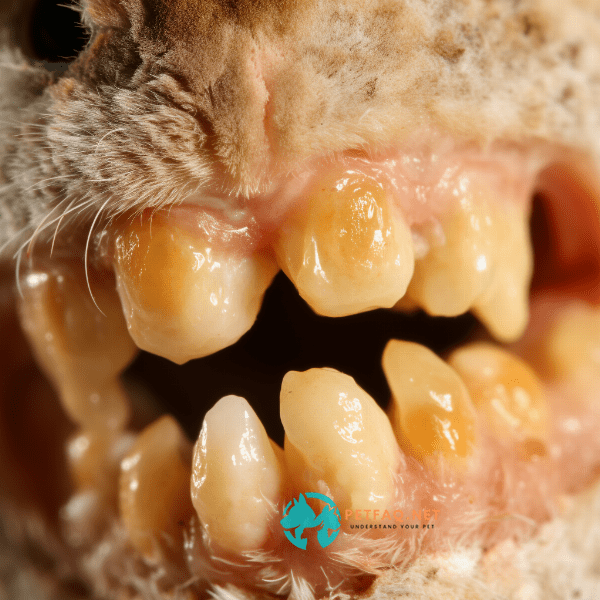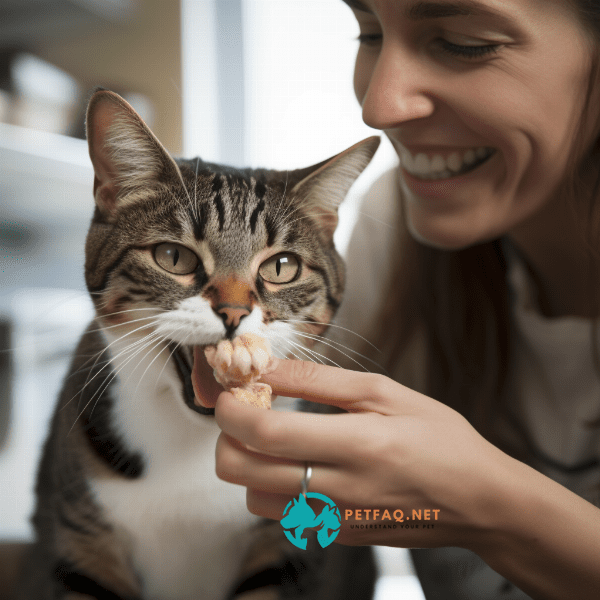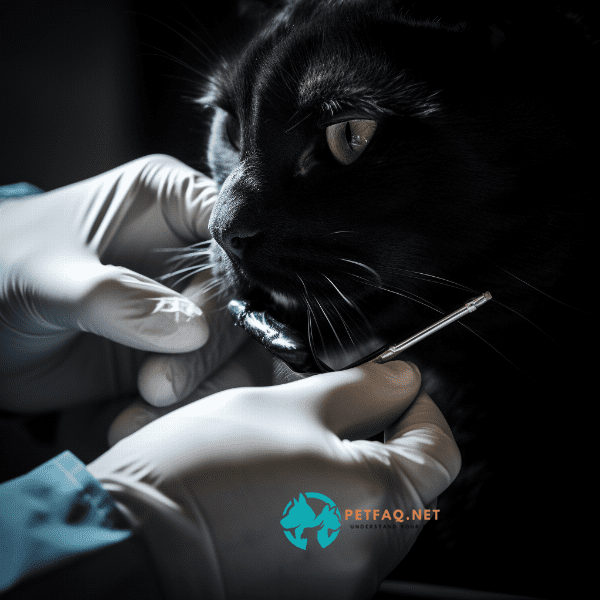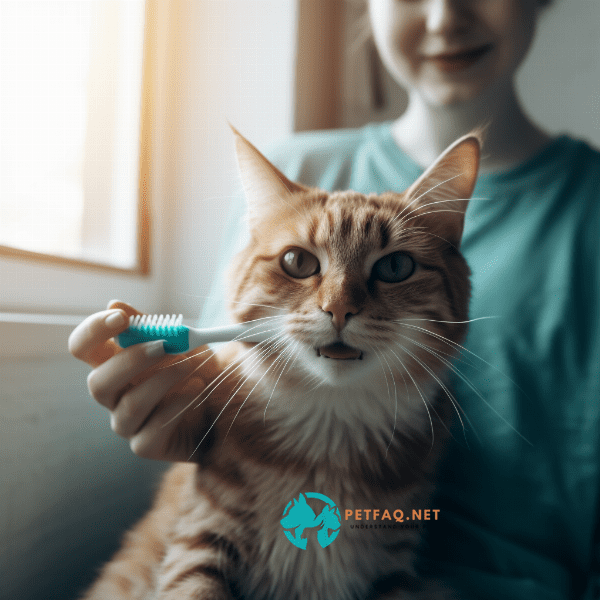Table of Contents
Why Feline Dental Health is Important
Cats are known for being independent and self-sufficient creatures, but that doesn’t mean they don’t require proper dental care. Feline dental health is just as important as their overall physical health, and neglecting it can lead to serious health problems in the future.
One of the most common dental problems in cats is the buildup of plaque and tartar on their teeth. Cat Plaque is a sticky film that forms on the surface of the teeth and contains bacteria that can lead to dental decay and gum disease. If left untreated, cat plaque can also spread to other parts of the body and cause more serious health issues such as heart and kidney disease.
Regular dental check-ups and proper dental care are essential for maintaining your cat’s overall health and wellbeing. This includes daily brushing, providing dental treats and toys, and scheduling regular cleanings with your veterinarian.
Preventing and removing cat plaque is not only important for your cat’s health but can also save you money in the long run. Dental procedures for cats can be costly, and in severe cases, tooth extractions may be necessary.
In summary, feline dental health should not be overlooked. By taking the necessary steps to prevent and remove cat plaque, you can help ensure your cat lives a happy and healthy life.

Understanding Cat Plaque and Tartar Buildup
Cat plaque is a thin, transparent film that forms on the surface of a cat’s teeth. It is caused by a buildup of bacteria and food particles and can eventually harden into tartar if left untreated. Tartar is a yellow or brownish substance that can accumulate on a cat’s teeth, causing them to appear dirty or discolored.
Cat plaque and tartar buildup are not only unsightly but can also lead to more serious health problems. When left untreated, tartar buildup can cause gum disease, which can lead to tooth loss and even affect your cat’s overall health.
The best way to prevent cat plaque and tartar buildup is to maintain a regular dental care routine. This includes daily brushing with a toothbrush and toothpaste specifically designed for cats. Dental treats and toys can also help reduce the buildup of plaque and tartar.
If you notice any signs of cat plaque or tartar buildup, such as bad breath or discolored teeth, it’s important to schedule a dental exam with your veterinarian. They can perform a thorough cleaning and check for any signs of dental disease.
In summary, understanding cat plaque and tartar buildup is essential for maintaining your cat’s dental health. By preventing and treating the buildup of plaque and tartar, you can help ensure your cat’s teeth stay healthy and strong.

Signs of Dental Problems in Cats
It’s important to be aware of the signs of dental problems in cats, as early detection and treatment can help prevent more serious health issues down the road. Some of the most common signs of dental problems in cats include:
1. Bad breath – Persistent bad breath can be a sign of dental disease, including cat plaque buildup.
2. Changes in eating habits – If your cat is avoiding certain foods or having difficulty eating, it may be due to dental pain or discomfort.
3. Discolored or broken teeth – Discoloration or broken teeth can be a sign of advanced dental disease and require immediate attention.
4. Drooling – Excessive drooling can be a sign of dental problems such as gum disease or tooth decay.
5. Bleeding or inflamed gums – Inflamed or bleeding gums are a sign of gingivitis or other dental diseases.
If you notice any of these signs, it’s important to schedule a dental exam with your veterinarian as soon as possible. Your veterinarian can diagnose the problem and recommend the appropriate treatment, which may include a professional cleaning to remove cat plaque and tartar buildup.
In summary, being aware of the signs of dental problems in cats can help you detect and treat issues early on. By keeping an eye out for these signs and scheduling regular dental check-ups, you can help ensure your cat’s dental health remains in top condition.

Tips for Preventing Cat Plaque and Dental Issues
Preventing cat plaque and dental issues is essential for maintaining your cat’s overall health and wellbeing. Here are some tips for preventing cat plaque and dental issues:
5. Water Additives: Water additives can also help prevent cat plaque buildup. Look for products that contain enzymes or other ingredients that help break down plaque and tartar.
By following these tips, you can help prevent cat plaque buildup and other dental issues in your cat. Maintaining good dental health can help ensure your cat’s overall health and happiness.

Home Remedies for Removing Cat Plaque
While regular brushing and professional dental cleanings are the most effective ways to remove cat plaque, there are also some home remedies that can help reduce plaque buildup. Here are some home remedies for removing cat plaque:
1. Coconut Oil: Coconut oil has antimicrobial properties that can help reduce bacteria in the mouth and prevent plaque buildup. Simply apply a small amount of coconut oil to your cat’s teeth and gums.
2. Apple Cider Vinegar: Apple cider vinegar is another natural remedy that can help remove cat plaque. Mix one tablespoon of apple cider vinegar with one cup of water and use it to rinse your cat’s mouth.
3. Raw Bones: Raw bones can help remove cat plaque by scraping it off the teeth. Make sure to supervise your cat while they chew on bones to prevent choking.
4. Parsley: Parsley has natural anti-inflammatory properties that can help reduce cat plaque and freshen breath. Simply add a few sprigs of parsley to your cat’s food or water.
5. Baking Soda: Baking soda can help reduce cat plaque and freshen breath. Mix a small amount of baking soda with water to make a paste and apply it to your cat’s teeth with a soft-bristled toothbrush.
It’s important to note that these home remedies should be used in conjunction with regular brushing and professional dental cleanings. If your cat has severe dental issues or a significant amount of cat plaque buildup, consult with your veterinarian for proper treatment.
In summary, while home remedies can help reduce cat plaque buildup, they should be used in conjunction with regular brushing and professional dental cleanings. By taking a proactive approach to your cat’s dental health, you can help ensure they have a healthy and happy life.

Professional Dental Care for Cats
While regular brushing and home remedies can help prevent cat plaque buildup, professional dental care is essential for maintaining your cat’s dental health. Here’s what you need to know about professional dental care for cats:
2. Dental Cleaning: A professional dental cleaning is the most effective way to remove cat plaque and tartar buildup. During a cleaning, your veterinarian will remove any visible plaque and tartar, as well as perform a deep cleaning under the gumline.
3. Anesthesia: In most cases, a professional dental cleaning for cats requires anesthesia. Anesthesia ensures your cat is comfortable and allows your veterinarian to perform a thorough cleaning without causing undue stress or discomfort.
4. Post-Care: After a professional dental cleaning, your veterinarian may recommend follow-up care, such as a special diet or supplements. They may also recommend regular cleanings to prevent cat plaque buildup in the future.
5. Cost: Professional dental care for cats can be costly, but it’s important to remember that prevention is key. Regular dental check-ups and cleanings can help prevent more serious dental issues and save you money in the long run.
In summary, professional dental care is essential for maintaining your cat’s dental health. Regular check-ups, cleanings, and follow-up care can help prevent cat plaque buildup and other dental issues. If you have concerns about your cat’s dental health, consult with your veterinarian for proper treatment.

Maintaining Your Cat’s Dental Health
Maintaining your cat’s dental health is essential for their overall wellbeing. Here are some tips for maintaining your cat’s dental health and preventing cat plaque buildup:
1. Daily Brushing: Daily brushing is the most effective way to prevent cat plaque buildup. Use a toothbrush and toothpaste specifically designed for cats, and make sure to brush all sides of their teeth.
5. Professional Cleanings: Professional dental cleanings are recommended at least once a year for cats. This is the most effective way to remove cat plaque and tartar buildup.
6. Observation: Regularly observe your cat’s behavior and look for signs of dental issues, such as bad breath or discolored teeth. Early detection can prevent more serious dental issues in the future.
In summary, maintaining your cat’s dental health is essential for their overall health and wellbeing. By following these tips and being proactive about your cat’s dental care, you can help prevent cat plaque buildup and other dental issues. Consult with your veterinarian for proper treatment and advice on maintaining your cat’s dental health.

Frequently Asked Questions (FAQs) about cat plaque:
1. Is there a genetic predisposition to cat plaque?2. Can a cat's diet affect the development of plaque?
3. How often should cats get their teeth cleaned to prevent plaque buildup?
4. What are the treatment options for cat plaque?
5. How long does it take for plaque to form on a cat's teeth?



